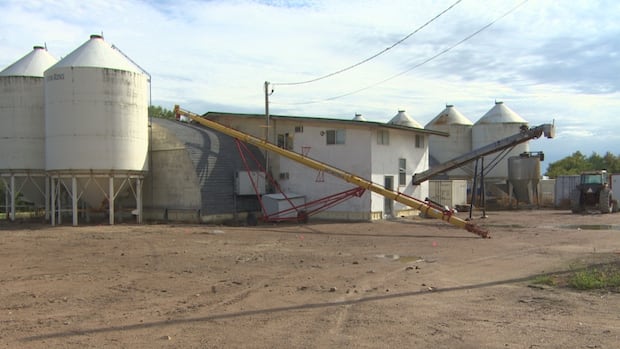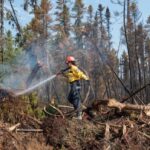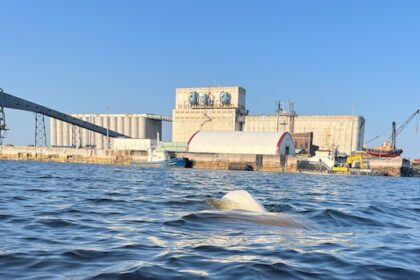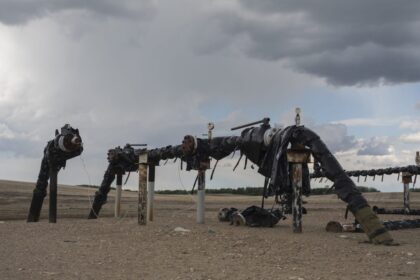Some residents and the local council of a southeastern Manitoba community say they’re worried about an environmental licensing application for a business they fear poses health and safety risks to the surrounding residential area.Documents published through the provincial public registry reveal formal opposition from the Town of Beausejour, about 50 kilometres east of Winnipeg, to the granting of an environmental licence to an existing fertilizer mixing and storage facility that has been operating for over 50 years without one.In an email to Manitoba Environment and Climate Change, one resident — whose identity was redacted in the email published through the public registry — said that for the past few years, they’ve noticed fertilizer residue on their children’s play structure, forcing them to frequently spray the structure down.The same person also said that due to the smell coming from the facility, it’s at times difficult for them to be outside in their backyard.Beausejour Mayor Ray Schirle said he’s heard these concerns before.”We have some concerns about the safety of having that facility in our community, between the dust and flammables, and stuff like that,” said Schirle. Beausejour Mayor Ray Schirle says the environmental licensing would give the town ‘the tools and mechanism so that we can actually enforce some of the outstanding issues that we have with that property.’ (Rudy Gauer/CBC)The business, Merke Bros. Bulk Material Handling Facility, is a small, family-owned business that generally blends, handles, and stores fertilizer and seed grains in what many years ago was an industrialized area. It also has the capacity to store urea, phosphate, ammonium sulfate, and various other chemicals and minerals. It’s located in a residential-zoned area, which has seen newer development in the last 20 to 30 years, Schirle said.In recent months, the business has begun the application process for an environmental licence, which is meant to ensure that facilities that could pose “significant environmental and/or human health effects” are kept up to code. Started operating before current regulationsThe process began after an inspection of the business in 2024 to assess concerns and ensure compliance with environmental regulations, said a provincial spokesperson. Current environmental licensing regulations didn’t come into effect until 1988, long after the company had begun operating in the area. That meant the business was not required to obtain an environmental licence unless it underwent significant changes, according to a provincial spokesperson. But Schirle said the licensing will “give us the tools and mechanism so that we can actually enforce some of the outstanding issues that we have with that property.””We just want them to be brought up the code so that it doesn’t become a hazard for our residents,” the mayor said.Eddy Volmering, the manager of Merke Bros., says he’s surprised by opposition to the environmental licensing. ‘It’s a lot more dangerous to live beside a gas station than it is a fertilizer plant,’ he said. (Rudy Gauer/CBC)Eddy Volmering, the current manager of the facility, says there haven’t been any major issues or accidents throughout the company’s decades of history. Volmering said that someone recently came to the business and told them that acquiring an environmental licence is a requirement, though he wouldn’t disclose who that person was.”Now we’re doing our due diligence to make sure that we are in compliance,” said Volmering. “We’re complying with all the changes that are necessary, and we’ll keep on top of things.”As part of the environmental licence application process, the provincial environment ministry seeks comments from various stakeholders and other ministries, which are made available through the public registry. Several provincial departments — including Lands and Planning, Inspection and Technical Services, Manitoba Transportation and Infrastructure, the Drainage and Water Rights Licensing Branch, and a medical officer with Manitoba Health — responded they had no concerns about the company’s application.However, others have a different perspective. The business has been operating for over 50 years in what was initially an industrialized area. Environmental licensing regulations didn’t come into effect until 1988, long after the company had begun operating in the area. (Rudy Gauer/CBC)CBC spoke to Beausejour senior who has been living close to the facility for five years. She has asthma, and says she has a hard time with the dust from the facility, particularly in the spring and fall — the busiest seasons for the fertilizer company.”It affects my breathing,” said the woman, who is over 80 years old and whom CBC has agreed not to name over her perceived fear of retribution in speaking out.”There’s more noise, there’s more dust. I can’t complain about the workers — I think they do what they can, but there’s only so much that can be done there.”‘Lack of care and precautions’: townIn a letter dated April 25, 2025, the Town of Beausejour officially opposed issuing an environmental licence agreement for the continued operation of the existing facility. The letter says the town has had an ongoing issue with the facility “not complying with fire code requirements for proper storage of chemicals,” and demonstrating a “disregard of spill containment, as well as potential health and safety risks to the surrounding area.””The lack of care and precautions taken by the current operators of this facility and the disregard for the potential danger that these operations could cause to the community has been evident, as compliance with regulations is only attempted when forced through bylaw enforcement and fire inspections,” wrote Christine Hutlet, the town’s chief administrative officer.In a letter dated April 25, 2025, the Town of Beausejour officially opposed issuing an environmental licence agreement for the continued operation of the existing facility. (Rudy Gauer/CBC)Volmering said it’s nearly impossible to entirely prevent the release of dust, though the business does use a dust control agent meant to reduce how much gets released beyond the facility’s property. He also noted that fertilizer is not flammable, which “greatly reduces danger.”Volmering also said the town’s opposition to their application caught him off guard.”I’m a little bit surprised that the town had a few objections against [the application], but those are things that are out of my control,” he said.CBC spoke with several residents of the town who live close to the facility, many of whom did not want to be formally interviewed. Reactions were mixed. Some expressed concerns about dust, noise, the smell and the appearance of the building.Others said they were either indifferent toward the facility and hadn’t really noticed it. Some others — many of whom either had a connection to the family that owns and operates the facility or to the farming industry — said they were in favour of its continued operation.Volmering says complaints about dust and fertilizer residue are “a little new” to him. “I don’t think it’s as big an issue as people make it,” said Volmering. “It’s a lot more dangerous to live beside a gas station than it is a fertilizer plant.”He said the business will keep on with its due diligence, but he’s confident that it will be granted the licence — in which case it plans to continue operations normally.He hasn’t thought too far ahead about what will happen in the event that the application gets denied, he said.Schirle said the town has written several letters to the province in the past listing its concerns about the continued operation of the facility at its existing location, but said without action from the owners, there’s only so much he and the Town of Beausejour can do.A provincial spokesperson said that “provided the facility operates within the limits, terms and conditions of the Environmental Act Licence, the province has no concerns.”Schirle says he understands the facility has been grandfathered in, but suggested a more suitable location for it may be in the city’s industrial area, away from more densely populated areas.”There’s chemicals there and there’s fertilizer and all these things,” said Schirle. “We just want to make sure that there isn’t a concern if there is a fire there, how it would impact our residents and the safety concerns — we just want to make sure that our residents are safe.”
Thursday, 5 Feb 2026
Canada – The Illusion
Search
Have an existing account?
Sign In
© 2022 Foxiz News Network. Ruby Design Company. All Rights Reserved.
You May also Like
- More News:
- history
- Standing Bear Network
- John Gonzalez
- ᐊᔭᐦᑊ ayahp — It happened
- Creation
- Beneath the Water
- Olympic gold medal
- Jim Thorpe
- type O blood
- the bringer of life
- Raven
- Wás’agi
- NoiseCat
- 'Sugarcane'
- The rivers still sing
- ᑲᓂᐸᐏᐟ ᒪᐢᑿ
- ᐅᑳᐤ okâw — We remember
- ᐊᓂᓈᐯᐃᐧᐣ aninâpêwin — Truth
- This is what it means to be human.
- Nokoma











